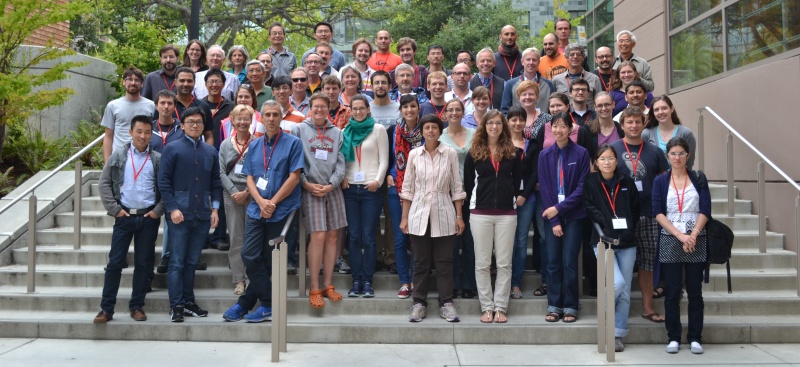Cider 2013
"From mantle to crust: continental formation and destruction"CIDER 2013 Summer Program, July 1 - August 2, 2013, University of California, Berkeley (CA) |

Summer Program links
- Instructor pages and lecture synopses (login required)
- Instructors please email the system admin for your user account.
- Instructions on creating instructor user page and file uploading . Successful login is needed to see the page.
- Research Groups Projects and room numbers (login required)
- Summer Program Tutorials (login required)
Resources from 2012 Summer program
- 2012 group research presentations relevant to this year's program.
- Several 2012 Summer program research reports are now open to the public. Follow the link to find out!
- CIDER 2012 evaluations from students and post-docs
- CIDER 2012 Faculty/Senior Participant Feedback
Goals and purposes
The purpose of CIDER 2013 is to bring together scientists from different disciplines to better understand how and when continents are formed and destroyed. A specific objective is to draw together independent datasets, ranging from geophysics (seismology, mineral physics, rheology, geodynamics) to geochemistry to surface processes. One goal will be to develop a synthesized view of the thermal, compositional, rheological, and geochronological structure of continents, from the lithospheric mantle to the crust. Continents and the processes involved in making continental crust play a fundamental role in modulating the thermal evolution of Earth’s interior, long-term climate change, and the evolution of life. These processes, themselves, can influence the growth, destruction and compositional evolution of continents. Thus, a second goal is to use continents as a means of better understanding the nature of coupling between the deep Earth and the exogenic system (ocean, atmosphere, biosphere). The time is ripe to bring these disparate datasets and perspectives together. With these constraints, participants will work together to explore new and existing models for continent formation and destruction from the Archean to the present, and in particular, use continent evolution as a foundation for better understanding the science of truly whole-Earth system.
Read more about the science motivation at the CIDER main site.
Program Organizers
Cin-Ty Lee (lead organizer) Thorsten Becker Richard Allen and Barbara Romanowicz (CIDER PI)
Schedule
- Week 1 (July 1 - July 5 2013): Informal program
- Weeks 2 - 4 (July 7 - July 26th, 2013): Tutorial Program for advanced graduate students and post-docs
- Weeks 4 - 5 (July 22 - Aug 2nd, 2013): Research group activities for all participants
Instructors:
Richard Carlson, Carnegie Institution of Washington Kent Condie, New Mexico Tech Rajdeep Dasgupta, Rice University Gerald Dickens, Rice University Josef Dufek, Georgia Institute of Technology Greg Hirth, Brown University Claude Jaupart, Universite' Paris-Diderot & Institut de Physique du Globe de Paris Adrian Lenardic, Rice University Maureen Long, Yale University William McDonough, University of Maryland Roberta Rudnick, University of Maryland Robert Stern, University of Texas at Dallas Kelin Whipple, Arizona State University Shijie Zhong, University of Colorado at Boulder Göran Ekström, Lamont-Doherty Earth Observatory, Columbia University Gene Humphreys, University of Oregon Meredith Nettles, Lamont-Doherty Earth Observatory, Columbia University
Instructors: please email the system admin for file uploading instructions.
As in previous CIDER summer programs, the program will begin with 1 week of KITP style unstructured program, followed by 2 weeks of tutorial for advanced graduate students and post-docs. During week 2, research group will form around selected multi-disciplinary topics that will emerge from discussions during weeks 1-2. During weeks 3-4, these topics will be further explored within multidisciplinary teams including junior and senior participants. As a new experiment in CIDER, in week 3, one lecture is scheduled every morning to start the day and finish the tutorial part of the program. A few short (20mn) research lectures may be given at the end of the day. There will be no lectures in week 5. A plenary session with summary presentations from each research group is planned on friday afternoon, August 2nd.